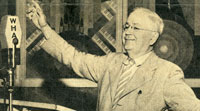
Among the first to perform on WHA in 1921, Edgar Gordon, host of Journeys in Music Land, was perhaps the most famous of all School of the Air broadcasters. For twenty four years, from 1931 to 1955, generations of students received his music appreciation broadcasts weekly in their classrooms. By the time he retired it was estimated that he had taught nearly one million students throughout the state of Wisconsin via the ether, and Journeys had become the longest running continuous radio music course broadcast to classrooms anywhere.
Born in Indiana, Gordon grew up in Kansas and trained at Columbia University. In 1901 Gordon relocated to Chicago, where he met Katherine Waugh, a secretary involved in the Chicago Commons, who introduced Gordon to Graham Taylor, director of the Settlement House. Gordon became involved with Chicago’s progressive movement, and directed an integrated chorus of ‘diverse racial origins’ that endeavored to ‘consolidate attainment of spiritual and social’ ends through musical collaboration. Gordon, in a short autobiography still extant in the archives, cites this period as having a profound influence on his social outlook, subsequently directing his educational goals to the fostering of “social integration, breaking down prejudices, and the spirit of friendship” (“On the Chicago Commons,” Gordon, Box 1 Folder 13).
After his work at the Settlement House he taught at Southwestern College in Winfield, Kansas for nine years, where an article he wrote on musical education for Good Housekeeping Magazine led to an invitation to join the University of Wisconsin-Madison School of Music faculty in 1917. At the University Gordon designed music appreciation lessons for underprivileged rural schools. In the late 1920s he sat on an advisory board for Walter Damrosch‘s Music Appreciation Hour—an NBC program that aired for schoolchildren between 1928 and 1942. Gordon was highly impressed by Damrosch’s experiments in radio listening, leading him to develop his own radio curriculum for WHA.
From his time with Damrosch he noted that students couldn’t maintain sustained attention through an entire half hour instruction if asked to simply listen to lectures and performances. Thus through trial and error Gordon developed a radio class that provided a ‘listening experience’ for students that favored responses to the inculcation of simple rhythms. Besides classical and popular American melodies, Gordon composed his own folk songs, asking that children learn not just tonal and rhythmic accuracy, but expressiveness and attunement to the overall musical experience. After hearing a song once or twice, students would be instructed to listen and point to the words and music in a course packet. Then they would be invited to hum along with a studio group, repeating neutral syllables such as ‘loo’, finally finishing each broadcast singing melodies and lyrics. By the time he retired he had written over four hundred songs, one hundred of which his wife wrote the lyrics for. The show became such a Wisconsin staple that each year the University would distribute 85,000 copies of fifteen separate music texts to registered participants (“An Adventure in Radio Teaching,” Gordon, B 1 F 13).
Following the success of the radio program, Gordon began to organize biannual music festivals. For the first festival only Madison schools were invited—but in an unguarded moment he mentioned the event on the radio, leading to hundreds of students showing up. The number steadily grew until they exceeded the capacity of the largest auditorium on campus, with students arriving from the most remote sections of the state, including students from Menominee reservations, who granted him the name ‘Ka-Ka-Koo, meaning ‘great hunter of songs’. Over 24 years Gordon hosted 125 festivals in 47 different counties in the state, which were conducted more like a live music lesson than a public performance (“Voice Over the Air,” Gordon, B 1 F 13).
The Wisconsin Historical Society archives feature three boxes primarily covering Gordon’s correspondences, addresses, and published academic articles. Also of note are a couple scrapbooks of photos and newspaper clippings related to Journeys, and scattered documents related to musical appreciation and education.
Digital Documents
Photographs
Students listen to Gordon broadcast
Related Links
Finding aid for Edgar Gordon collection, WHS
